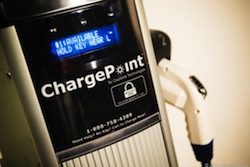ChargePoint has teamed up with Key Equipment Finance, one of the nation’s largest bank-held equipment finance companies and an affiliate of KeyCorp, to spur mass electric vehicle (EV) adoption throughout the country. The two companies have launched a $100 million lease-to-own program for EV charging stations that will give small and medium sized companies and municipalities the opportunity to install EV chargers at no upfront cost. According to ChargePoint, this is the first comprehensive, turn-key program that allows for pay-as-you-go financing of charging stations, installation costs, operational services and warranty.
 The new initiative known as The Net+ Purchase Plan can provide a net positive cash flow for companies or public entities depending on charging usage.
The new initiative known as The Net+ Purchase Plan can provide a net positive cash flow for companies or public entities depending on charging usage.
“Through this program, companies and municipalities can now offer their workforce EV charging for no more than the price of a couple of cups of coffee per day,” said Pasquale Romano, CEO of ChargePoint. “By providing EV charging to workers, employers are essentially giving their employees a raise of up to 5% as a result of reduced fuel costs. In addition, companies increase productivity, allow their employees HOV lane access, and support important sustainability and environmental policies. This is a win-win-win for employers, employees, and our communities.”
ChargePoint says the program is the first large scale financing solution offered in the EV market to address a known barrier to EV adoption. Fashioned after the success in the solar industry, the innovative purchasing program should drive adoption by significantly lowering up front installation costs.
“We are thrilled to partner with ChargePoint to offer flexible financing options to companies and municipalities interested in installing EV charging stations,” said Tim Duerr, senior vice president of business development at Key Equipment Finance. “This program makes it much easier for municipalities and businesses with budget or cash-flow constraints across the U.S. to cover both the hard and soft costs associated with EV chargers, and we look forward to seeing this program grow as more organizations realize how cost-effective and beneficial EV chargers can be.”

